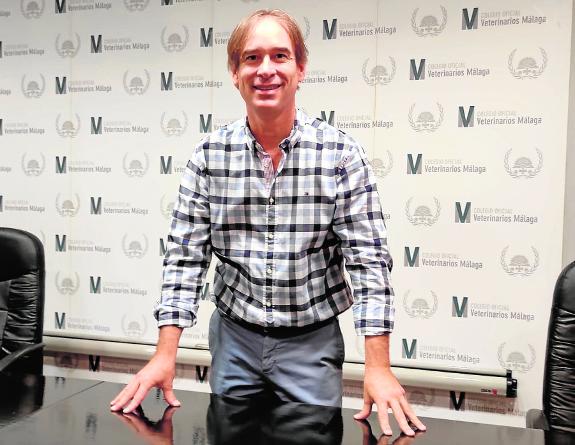'Anyone who thinks an animal is like a human being is very much mistaken'
The new president of the Malaga vets association wants to open the institution up to society and be involved in decision-making about public and animal health
IGNACIO LILLO
Martes, 10 de noviembre 2020, 17:42
The Official College of Veterinarians in Malaga (Colegio Oficial de Veterinarios), the professional association for vets practising in the province, recently elected Juan Antonio de Luque as its new president. He combines his new role with the presidencies of the Association of Equine Specialist Veterinarians of Spain and the Ibero-American Federation which is its counterpart.
What made you decide to stand for election as president?
My philosophy in life is to give the best of myself where improvement is needed. As president of the Association of Equine Specialist Veterinarians I have had contact with many of the associations in the country and I saw how they functioned differently from us. I set about trying to improve our association and the situation for vets.
At times, has the institution been a bit distant from the social debates that affect it?
Yes, in general society only knows about our work in preventing and treating illness in dogs and cats, but vets also participate in preventing risks to human health in the food chain and detecting the illnesses called zoonosis which can be passed from animals to people. There is a lot about our work that people aren't aware of. Now we want it to be better-known, for society to be aware of it so they see vets as defenders of human health, as the first barrier to stop illnesses like the coronavirus occurring. Vets are used to dealing with epidemics. Some regions, such as Andalucía, have vets on their committees of experts but the Spanish government doesn't. That's one of the challenges we have set ourselves: for people in Malaga to know more about us and for us to participate in the lives of people in the province in different ways relating to public and animal health.
How do you get on with animal welfare groups?
A vet is the professional who knows most about the physiopathology of animals and is best qualified to determine the conditions of animal wellbeing. Animal supporters are people who love animals and some know a bit about them. But let's not get confused about this: an animal does not have the same needs as a human. If you think it does, you should be aware that you are mistaken. Animals have different needs because of their own physiology. People who treat animals like humans are making a mistake. A vet is the best person to talk about animal welfare.
What is your opinion about the invasion of parakeets in Malaga?
It is an invasory species and legislation says that they can be eradicated, although we haven't yet started to do that in Malaga. We are calling an immediate meeting of vets who are experts in exotic species and birds to establish the association's official position on this. We want to give our point of view and place ourselves at the disposition of the authorities.
Malaga is one of the few cities where it is obligatory to identify dogs through their DNA.
The new board will give a voice to the 1,000 vets in Malaga province so they can give their opinion and we can make a majority decision on our position, but it is clear that most veterinary associations in Spain do not support it.
Why is that?
We already have electronic identification through the microchip, and the DNA tests can give a lot of false positives. We are going to draw up a report with the official position, because right now opinion is divided.
People often complain that vets are expensive. What's the situation regarding IVA (value added tax)?
We are medical centres and we are classified as such, but despite that they impose a 21% rate of IVA on us as if we were luxury items. Prevention of illness should not be subject to the same IVA as a luxury item and the association has been calling for this to be changed for years. The IVA applied to us needs to be lower to prevent illnesses and improve animal and human health.
As someone who is a specialist in such matters, what is your opinion of horse-drawn carriages for tourists?
The General Council of Veterinarians of Spain has produced a guide to good practice for horse-drawn carriages in urban areas, and it is available to all authorities. There must be shade for the animals while they are standing waiting and their hours and conditions of work must be regulated, but we don't want to prohibit an activity from which families make a living and which is legal.
Finally, are you going to do anything to combat the problem of unqualified practitioners?
Our profession has always suffered from this. One example is animal physiotherapy, which should only be carried out by vets because other professionals are not authorised to treat animals. We are going to fight this non-professional competition directly in Malaga, and also via the Council in Andalucía and Spain. The same thing happens with veterinary odontology. There have been cases where people who are not vets have been sentenced by courts for that. We will remain vigilant.
